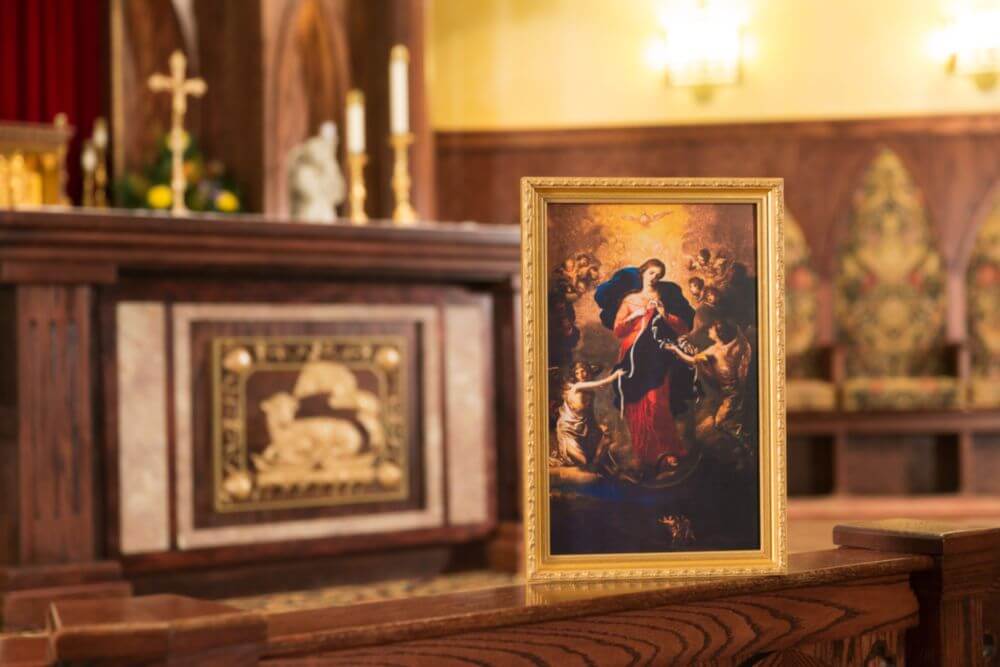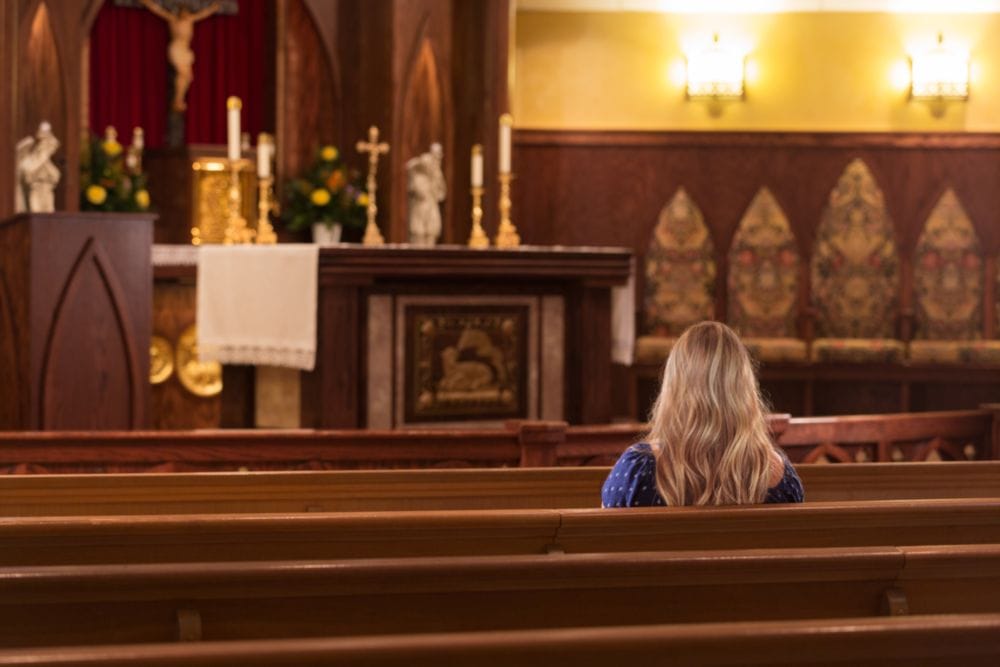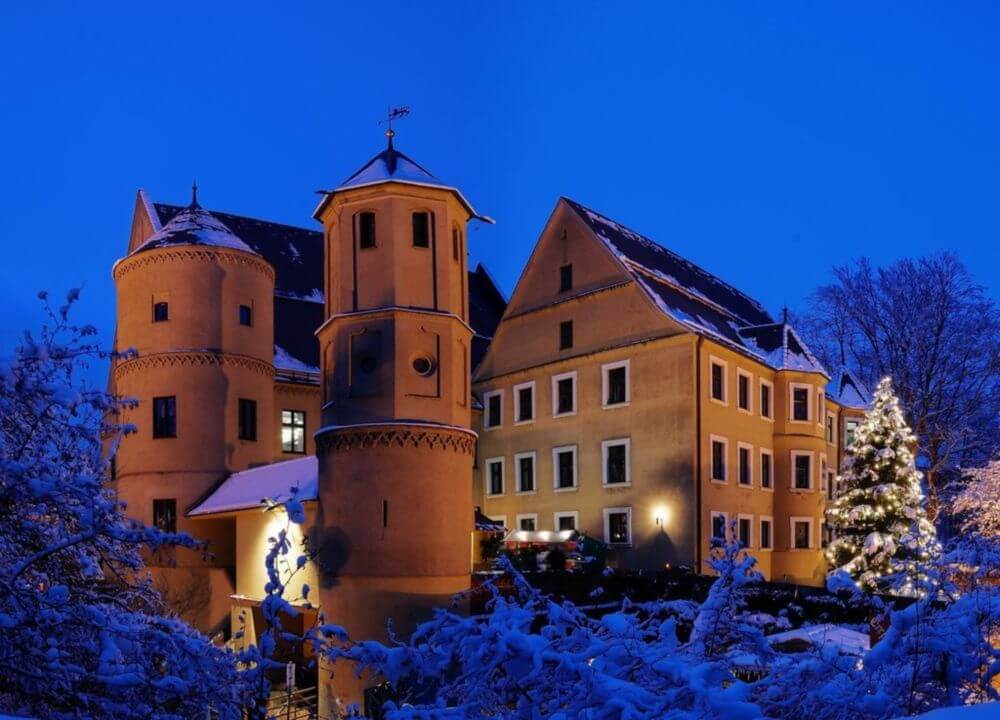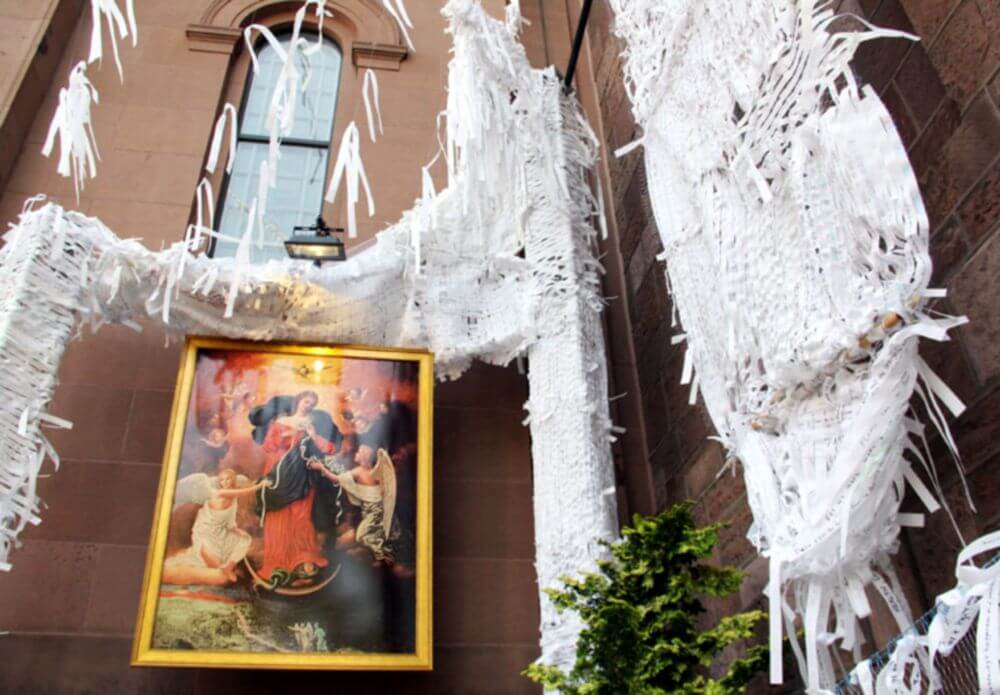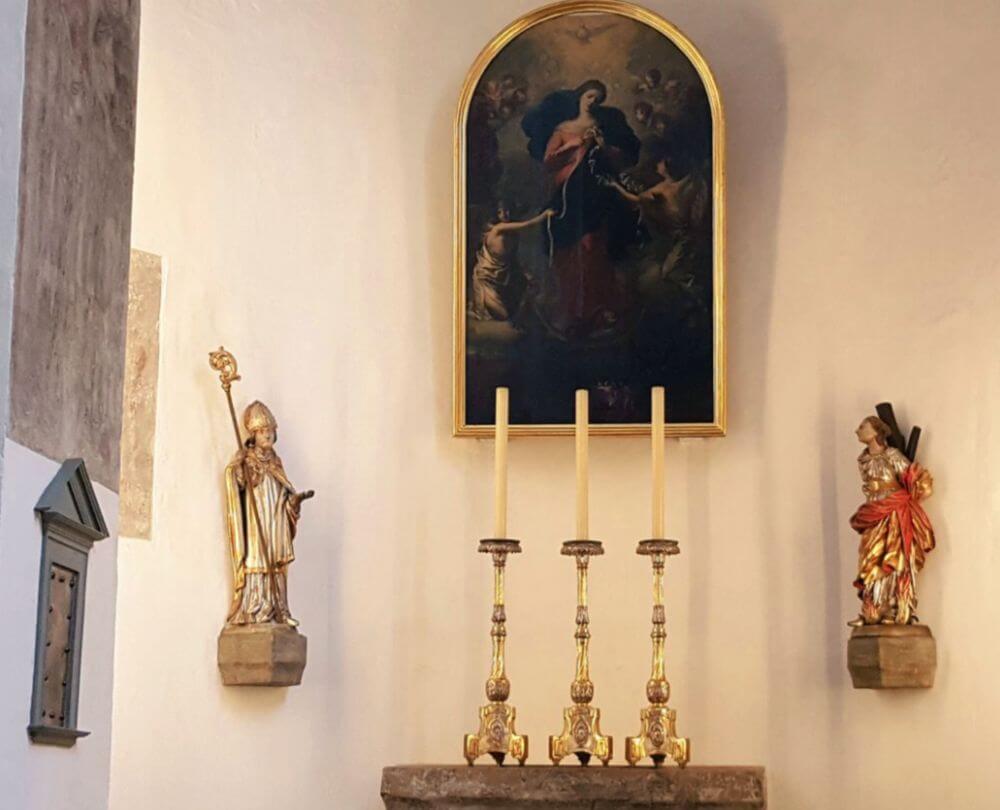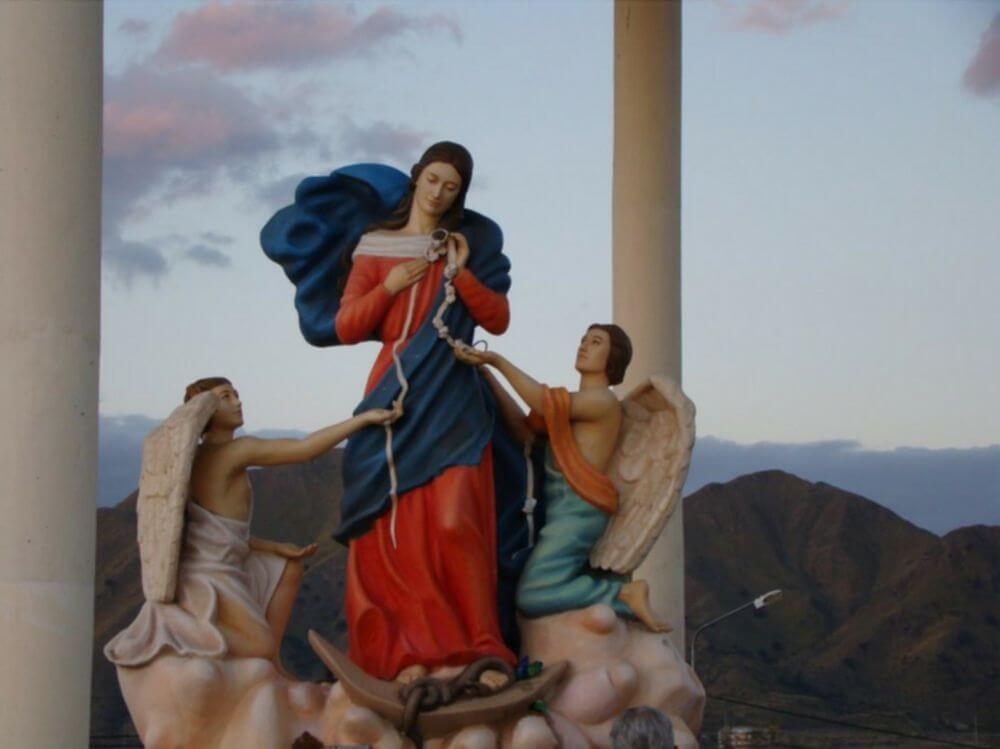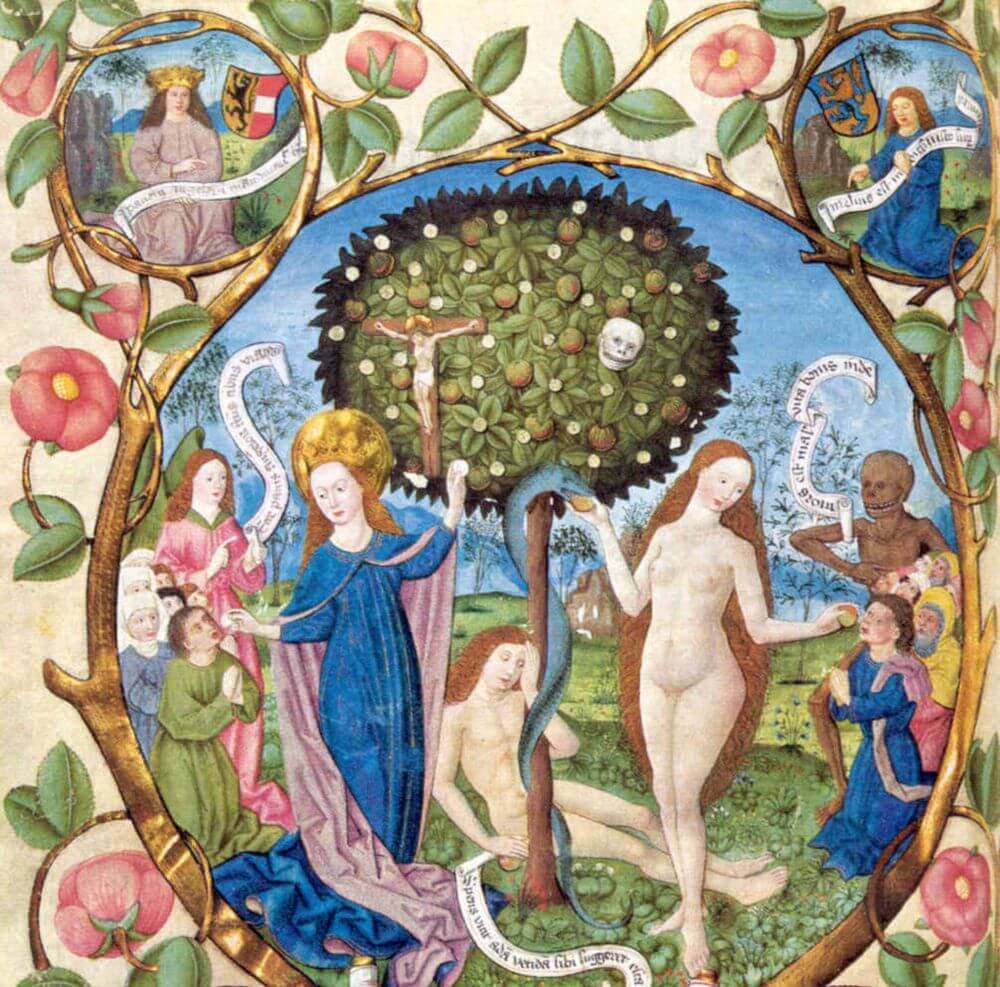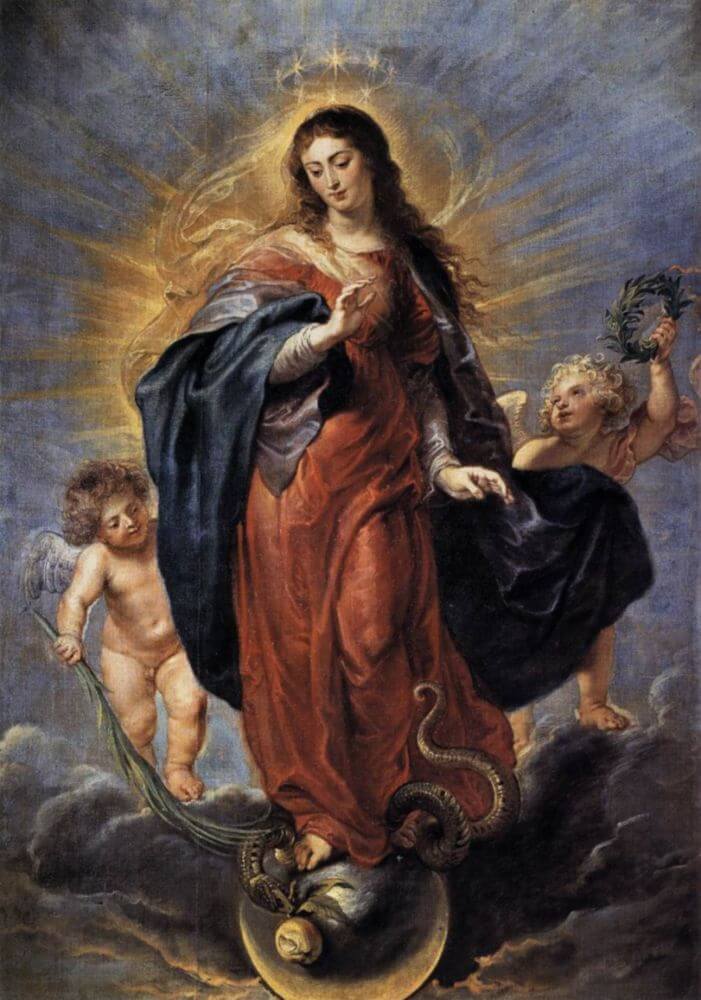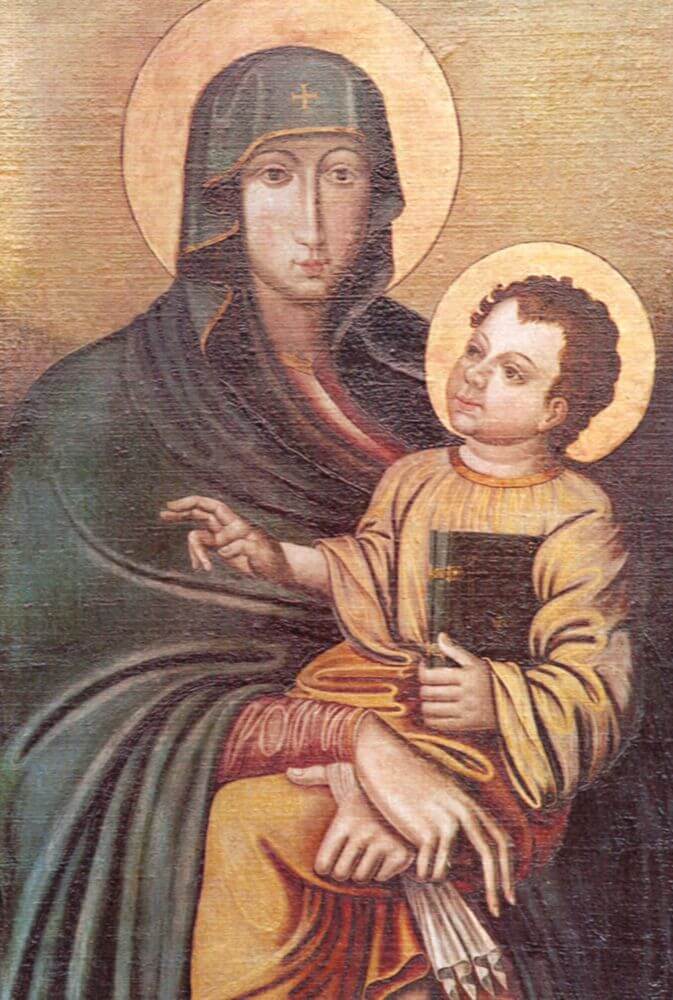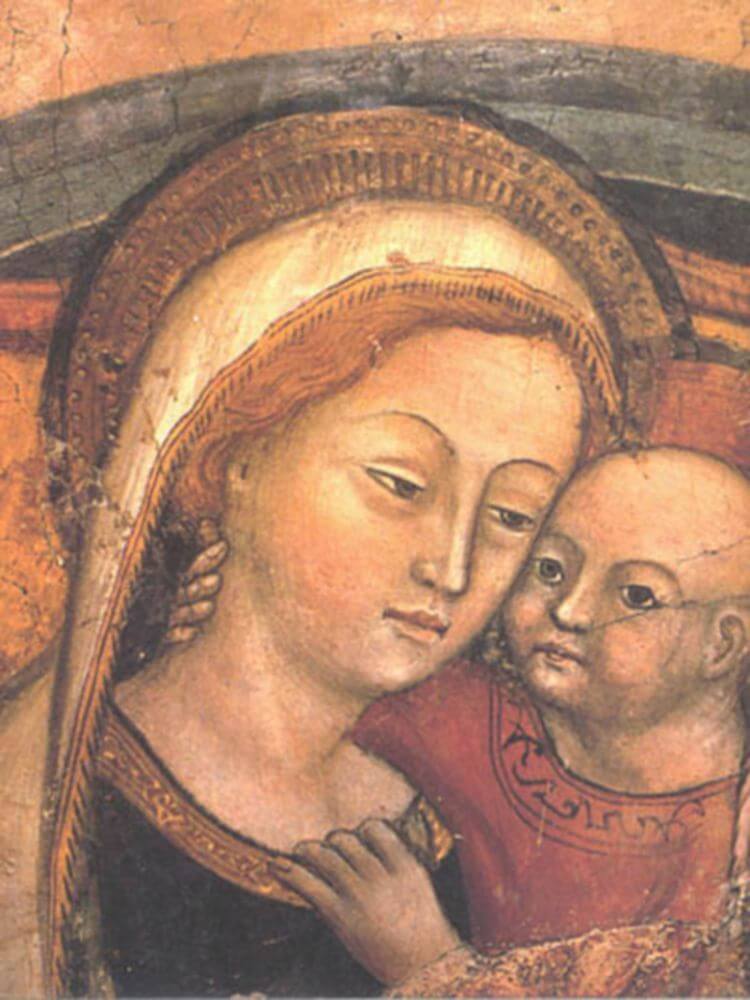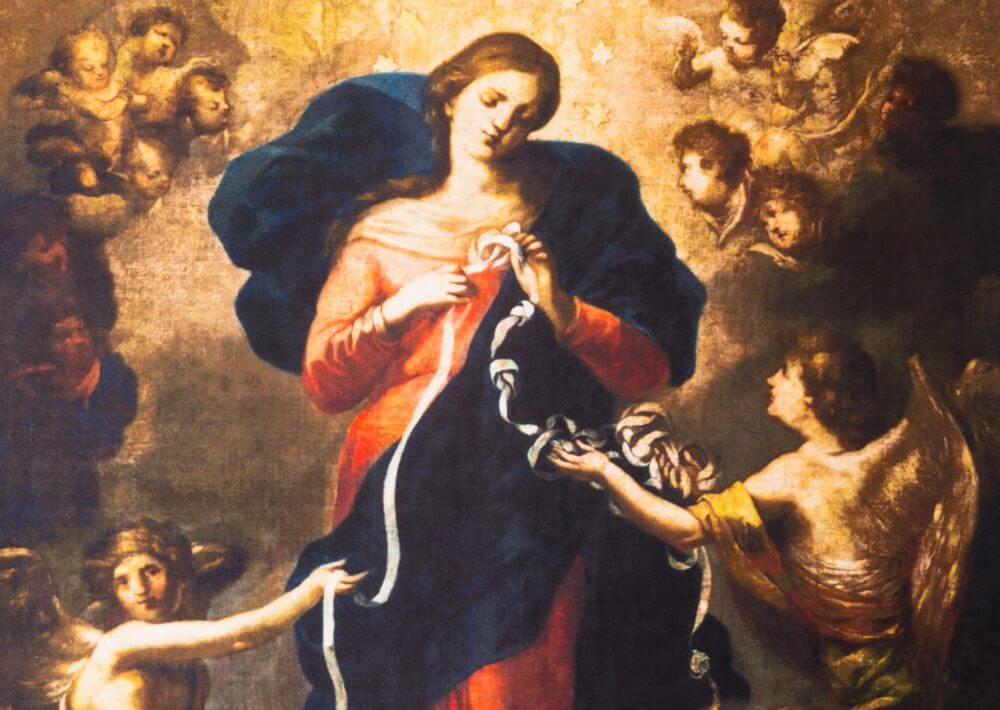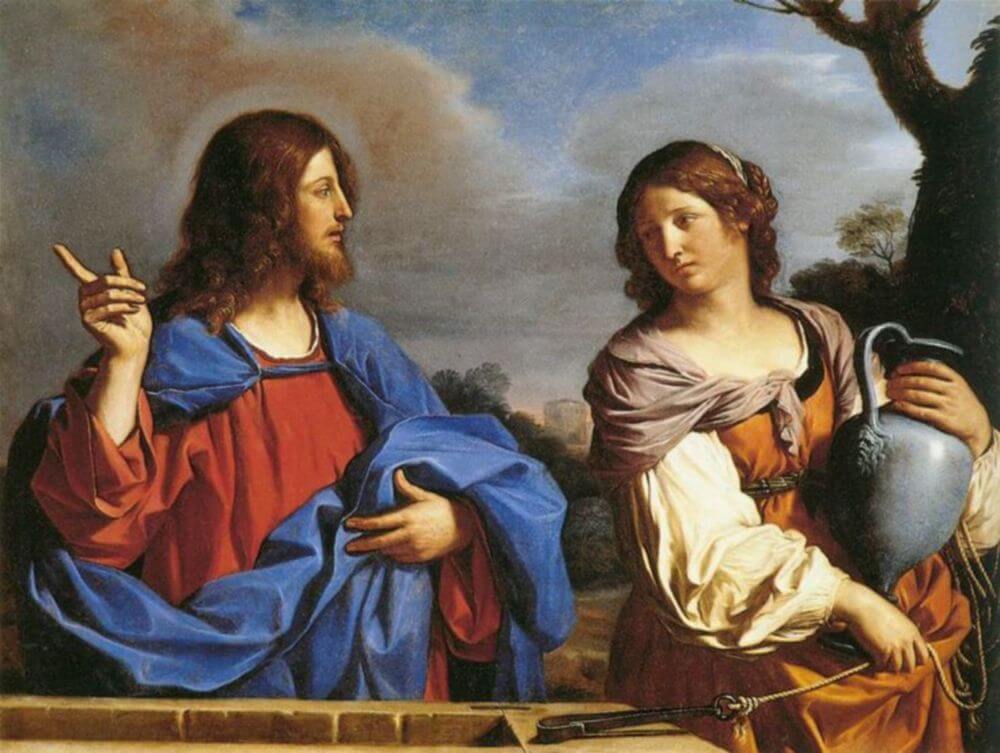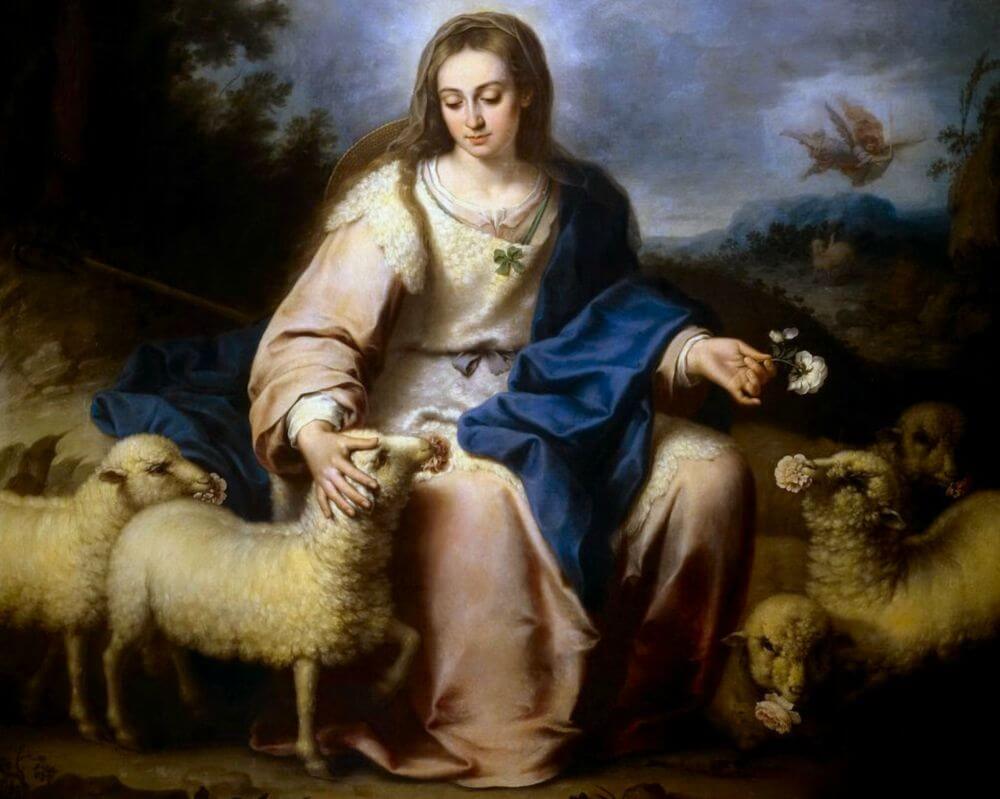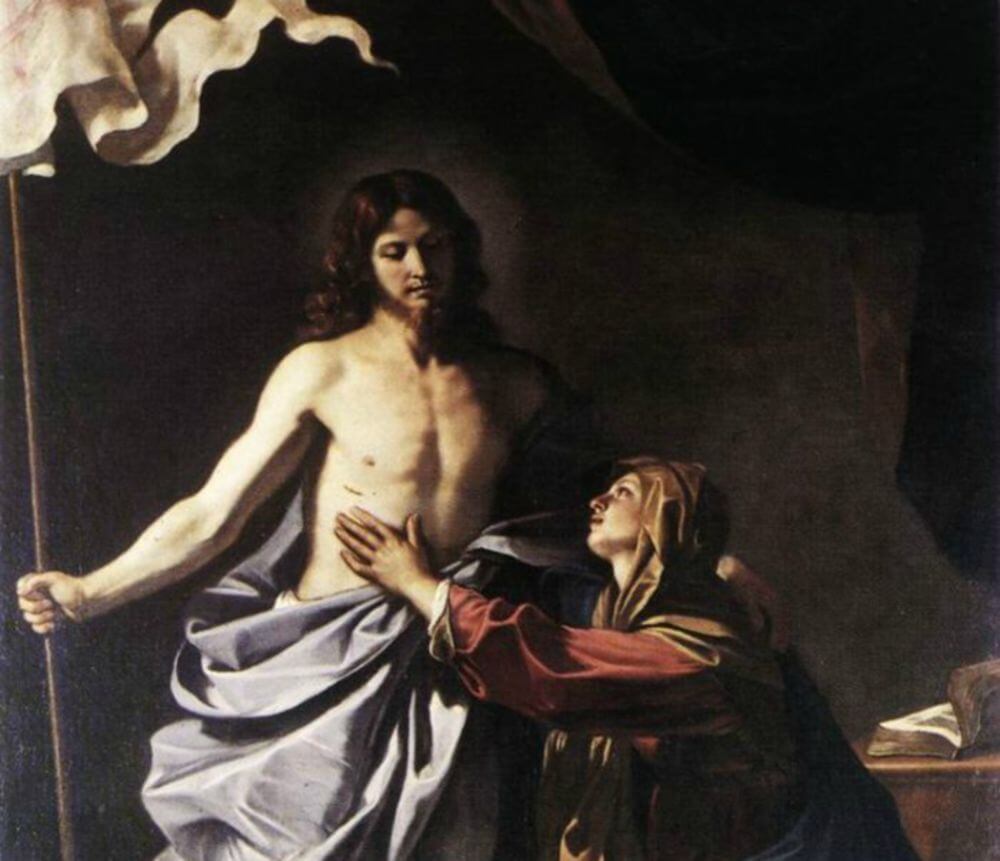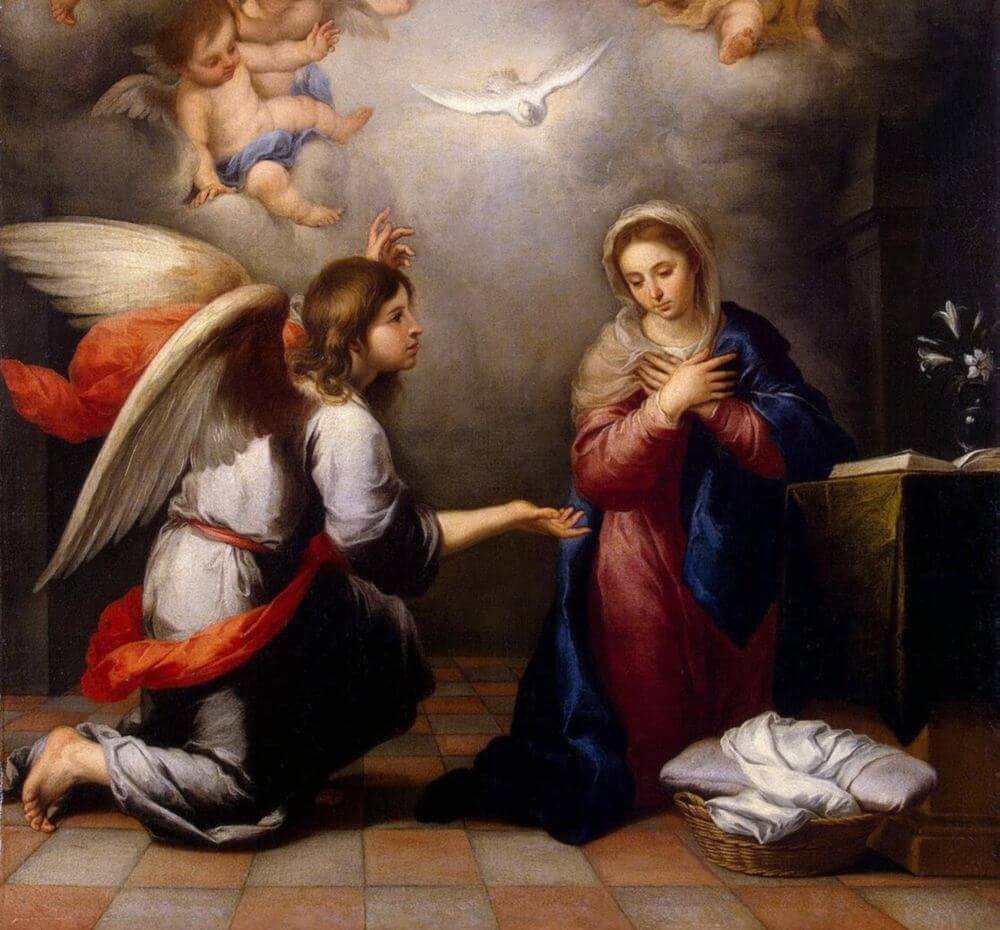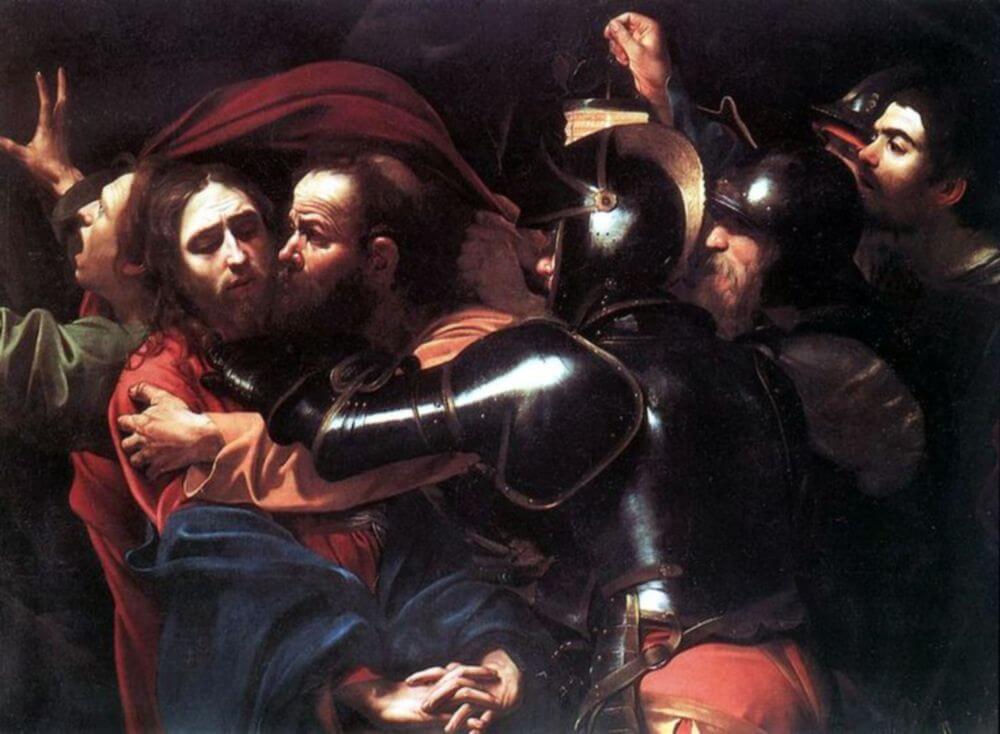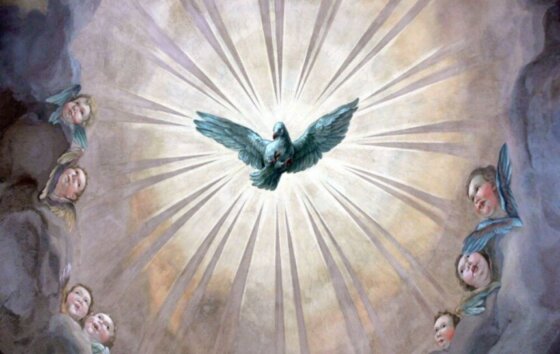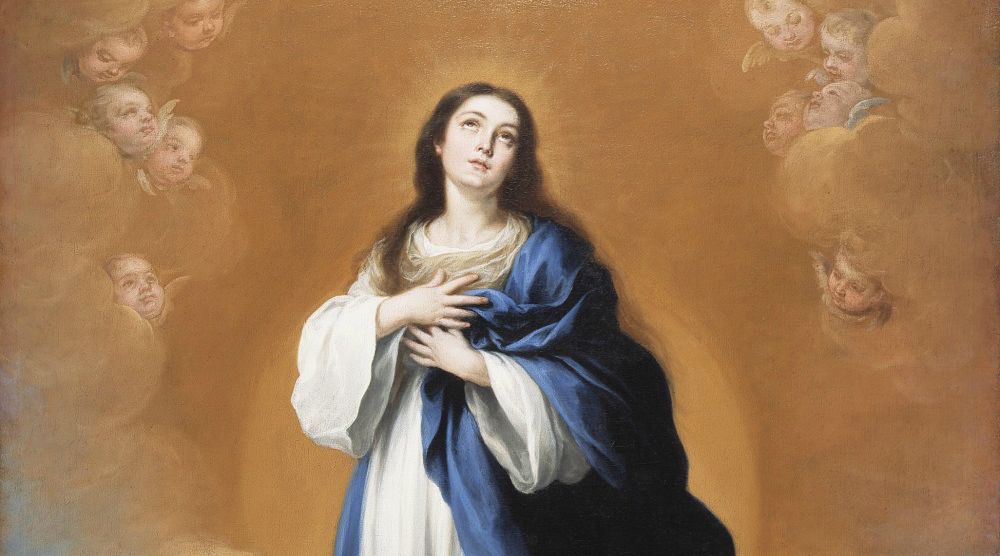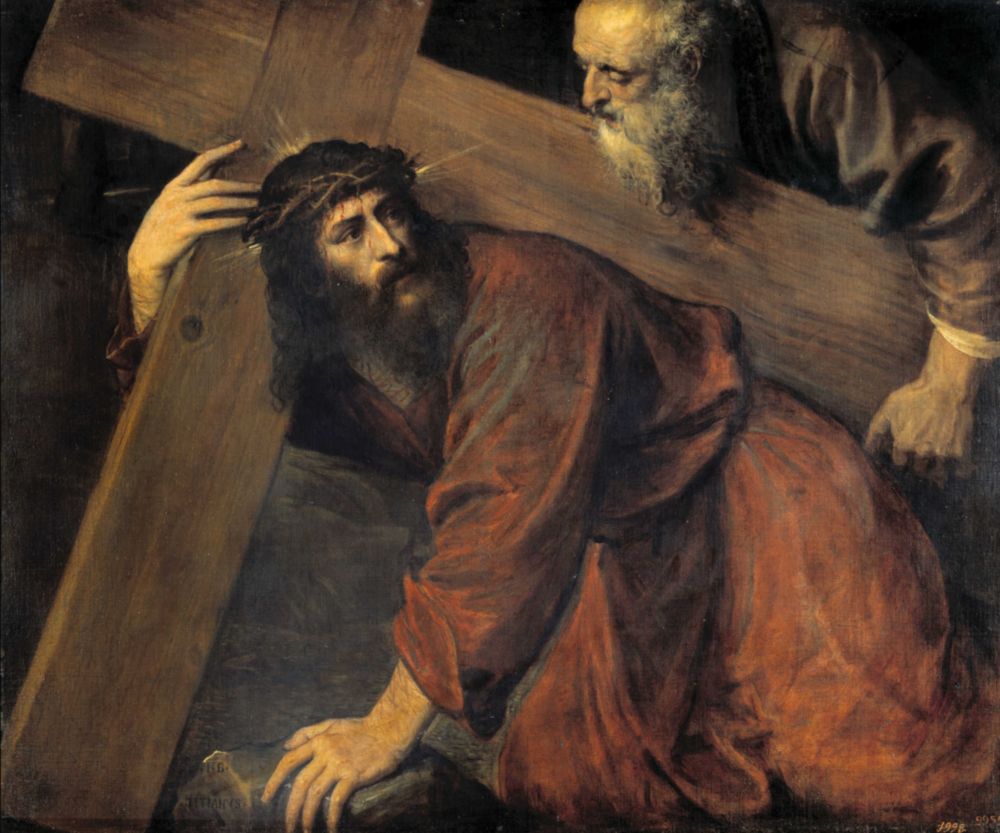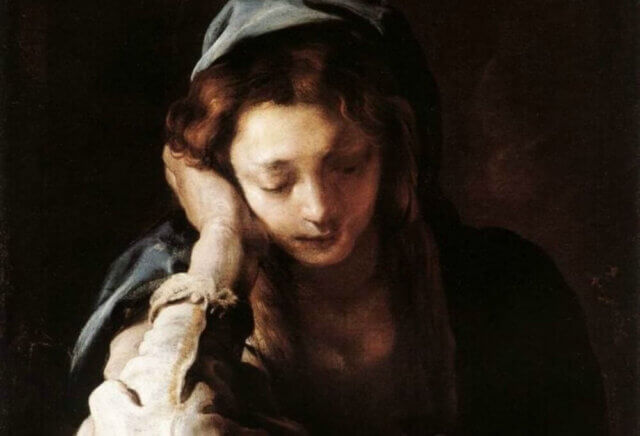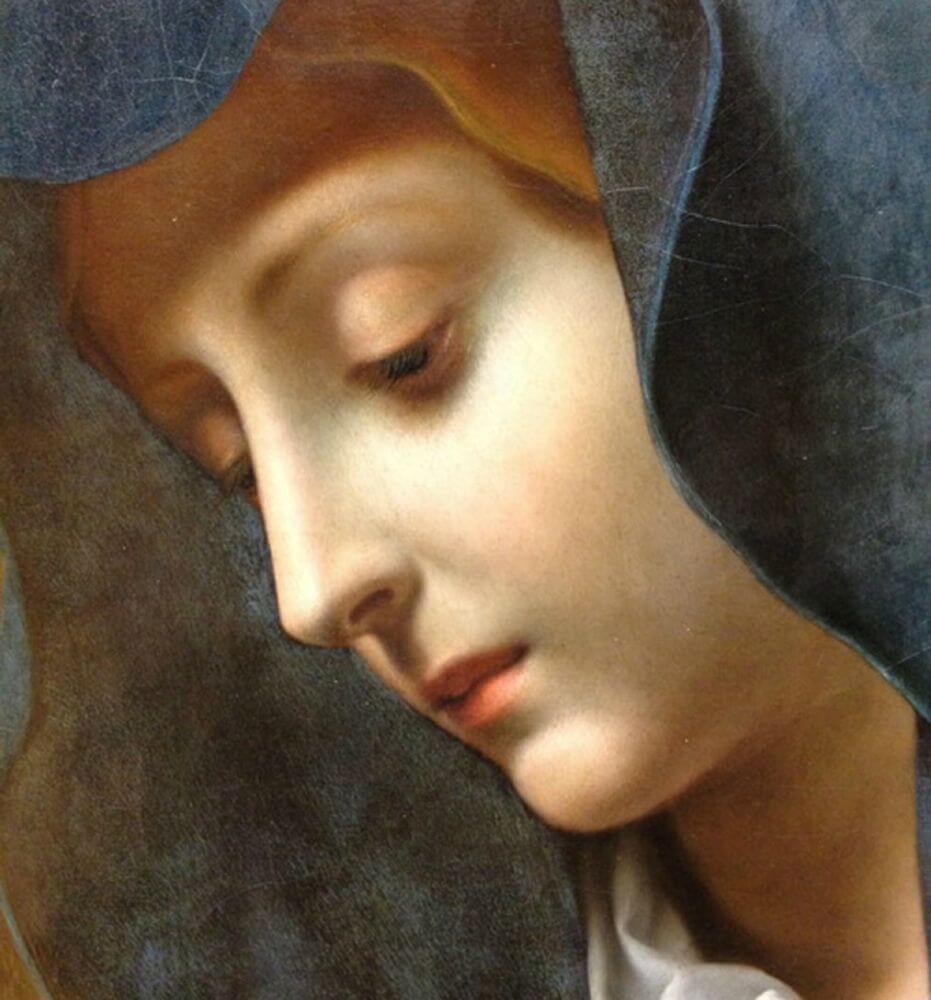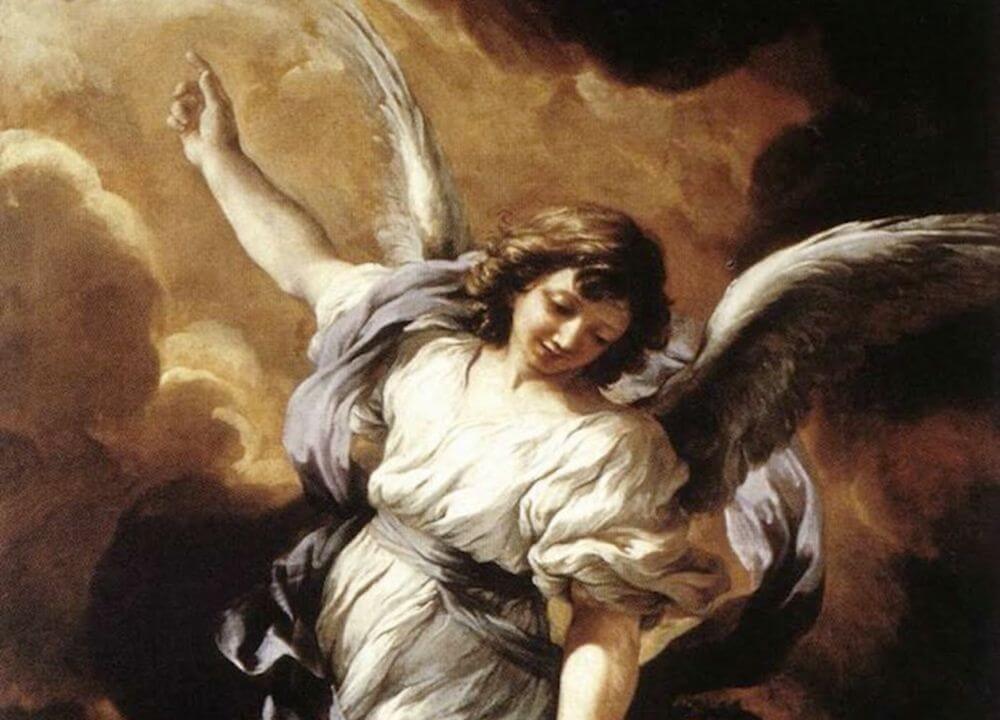1 of 21 Our Lady Undoer of Knots
A new Marian devotion has appeared in the universal Church at a time when our sinful disorders, both individually and collectively, have twisted us up in knots. Providentially, this devotion addresses the urgent needs of our broken, wounded world.
A devotion to the Blessed Virgin Mary that has grown in popularity among the Catholic faithful in recent years has an interesting and unusual title: Undoer of Knots.
The devotion is centered on an image of Our Lady untying a series of knots in a long wedding ribbon. The devotion originated with a troubled marriage on the brink of divorce that was restored to health through Our Lady’s intercession. This saving event was afterwards memorialized in a painting of the Blessed Mother serenely untying the knotted wedding ribbon which represented the couple’s marital disharmony.
This devotion has become famous around the world because it is a favorite of the Holy Father, Pope Francis. It has now taken root among the faithful as an efficacious means of turning to Mary’s intercession for life’s most difficult problems, symbolized by the simple yet fitting concept of handing her our “knots” to unravel.
Before diving into the history behind this devotion, we must first consider its fundamental components. First, what is a knot? What causes them? Second, what is a devotion? What purpose does this devotion serve in the life of the faithful? With these considerations we will better understand why a devotion has arisen in the Church that pertains to our knots.
What is a Knot?
The painting was not the first time that Our Lady was associated with knots; this imagery has theological roots in the ancient Church. In the second century, St. Irenaeus of Lyons, an important early Church Father, explained the Blessed Virgin Mary’s role in salvation history as untying the knot of Original Sin.
“The knot of Eve’s disobedience was loosed by Mary’s obedience. For what the Virgin Eve had bound fast through unbelief, this did the Virgin Mary set free through faith.”
St. Irenaeus of Lyons, Against Heresies
For St. Irenaeus, a knot represented the seemingly irreparable sinful condition of humanity itself. In the context of the painting, Our Lady is unraveling the particular knots that were causing strife between a husband and wife. For us, a knot can be any problem, conflict, weakness, failing, or misery that we endure – within our souls, in our relationships, or in our daily trials – which brings hardship and struggle into our lives.
Everyone has knots. Essentially a knot is anything that inhibits or blocks the divine action of God’s grace working within us or in our circumstances. A knot makes us stuck. Sometimes we can identify the knot clearly. Other times we may only know that something is amiss, without knowing exactly what it is. Knots can be deeply rooted in our souls, or they can concern our outward circumstances. Often they can be both, with one giving rise to the other. When they are not handled appropriately, knots have a tendency to enlarge, harden, or multiply.
What Causes Knots?
The root cause of all our knots is our fallen world. The tragic consequence of the sin of our first parents, Adam and Eve, is that we inherited a predisposition to sin embedded into our souls. This predisposition to sin, however, does not mean that we must sin. God gave us a free will to choose the good or the bad. Therefore, we can be more or less sinful, more or less aligned with God’s will for our lives. While we have no choice in the natural evils of our fallen world such as illness, pain, and death, we can make the choice to root out the sin in our lives that may negatively affect how we handle them.
For the last few hundred years mankind has become more sinful, drifting further and further away from God by choice. People have not been living according to the plan of their Creator. Human society has not been functioning according to God’s law inscribed in our very nature. The danger of modern man’s present condition was announced at Fatima. If Our Lady of Fatima warned us that mankind was at its farthest point from God one hundred years ago, in dire need of repentance and amendment of life, what is the condition of mankind today?
Today knots abound in our souls, in our families, and in our society and culture. We have more broken marriages and families than ever before. Addictions are commonplace, whether it’s to substance abuse, technology, pornography, consumerism, or constant entertainment that numbs us to the tension of the knots pulling on our souls. This has left us without peace. Our society and culture is breaking down at a rate that is unprecedented in previous generations. Suicide is at pandemic levels, especially among young people. We have more instability in our emotional and mental health than ever before. We are anxious. Anxiety has now surpassed depression as the number one mental health problem in America. Anxiety disorders affect 40 million adults in the United States—18% of the population—every year. The New York Times recently reported that while many consider this a medical condition,
“Anxiety is starting to seem like a sociological condition, too: a shared cultural experience.”
This points to the truth that we do not live for ourselves. For good or for ill, we are affected by what happens around us and the choices that others have made, both in the present and in the past. Likewise, our actions, past and present, affect others. We are all intertwined.
“We should recall that no man is an island, entire of itself. Our lives are involved with one another, through innumerable interactions they are linked together. No one lives alone. No one sins alone. No one is saved alone. The lives of others continually spill over into mine: in what I think, say, and do, and achieve. And conversely, my life spills over into that of others: for better or for worse. So my prayer for another is not something extraneous to that person, something external, not even after death.”
Pope Benedict XVI
Because humanity is a family, all of us absorb the harmful effects of unchecked sin, whether we realize it or not, and these effects create knots in our lives. The farther we stray from God’s will for our lives, the more problems we necessarily face. As a result we are collectively becoming more twisted, more knotted up. We do not comprehend the danger of our present state; we are no longer aware of our sinfulness. Pope Pius XII recognized this problem in 1946 and famously stated,
The greatest sin today is that men have lost the sense of sin.
Pope Venerable Pius XII, Message to the National Catechetical Congress of the United States, 26 October 1946
The effect of living apart from God’s design is that we become more disordered. This disorder increases first in the individual soul, then creeps into the family, then into society, and finally, into the culture itself. These disorders are affecting us in ways that we may not even realize. In an age when we cater to the comfort of our bodies and neglect the discipline of the soul, it is no wonder we are seeing virtue deteriorating and vices reigning in our culture and society. Christians are not immune from the effects of increasing sin in the world. These disorders also creep into the Body of Christ and often result in the worst knot of all—a loss of faith.
That Body of which you are members has been threatened. That Body of Christ which is His Church, is menaced not only by hostile powers from without, but also by the interior forces of weakness and decline. You have been alerted to the danger. The growing weakness, the devitalizing process that has been going on — We speak with sorrow in Our heart — going on in not a few parts of the Church is due chiefly to an ignorance or at best a very superficial knowledge of the religious truths taught by the loving Redeemer of all.
Pope Venerable Pius XII, Message to the National Catechetical Congress
How can we begin to heal the troubles and weaknesses in our souls, in our relationships, and in our societies? How do we unravel these knots?
God Gave Us a Mother
God’s providence never leaves us without a remedy; in His loving mercy, He always gives us what we need, when we need it. He sees the bad state of our souls, the poor quality of our relationships, and the harmful condition of our societies—and this is not how he wants us to live. Christ died to set men free from sin, so that we could be properly ordered, so that we could be in right relationship with Him and with one another, to live in peace and justice. When we go astray, individually or collectively, He always points to a path that will lead us back to Him. The way that He leads us back to Himself is the same way that He came to us: through His Mother.
Christ is so good that he not only wants us to return to Him, He also wants to heal the woundedness that we incurred while we were living outside of His will. He knows that we have reaped a tangled mess on account of our own sins and the sins of others. Who better to set things in order than His good and wise Mother? Just as a child goes to its mother with a hopelessly tangled mess of knots, so too we go to Our Lady.
One of the important and practical ways that we go to Mary is by means of the popular religious devotions that signify her relationship with her children. Which brings us to our next consideration: what is a religious devotion exactly, and why do we need them?
What is a Religious Devotion?
A devotion is a pious act or religious practice that serves to increase our love for God. They are outward expressions of our inward fidelity and constancy in the practice of our faith. Devotions are both the evidence of a lived faith, as well as an aid to help us live our faith more deeply.
The Church richly abounds with devotions of all kinds; their number is nearly impossible to count. We have devotions to saints and angels, devotions to different aspects of Christ’s Passion, and devotions to Mary under a myriad of titles. Devotions have arisen at various times to meet particular spiritual or temporal needs across cultures for two millennia, reflecting the universality of the Catholic faith. There are devotions for all times, all seasons, and all circumstances. They teach us to apply the truths of the faith to our current needs, whether big or small, and to help us increase in virtue and holiness. And if there is a particular need that is not met by an existing devotion, a new one providentially arises, “for the pious ingenuity of the faithful is fertile in new devices” according to the Catholic Encyclopedia. Such is the case with Mary Undoer of Knots. Providentially, this encouraging Marian devotion has been introduced into our hurting world just when we need it the most.
Why This Devotion?
St. Paul the Apostle taught us in Sacred Scripture that in the troubles of this life we do not contend with flesh and blood, but with the devil himself:
“For our struggle is not against enemies of blood and flesh, but against the rulers, against the authorities, against the cosmic powers of this present darkness, against the spiritual forces of evil in the heavenly places.”
Ephesians 6:12
Although our sinfulness is at the root of our knots, the devil is at the root of our sinfulness. Satan is the Deceiver and the Father of Lies. It was he who deceived our first parents, Adam and Eve, thereby plunging our human nature into spiritual death. As a result, evil entered the world, disorder was planted into our souls, and our relationship with God was severed. Just as he did with the first marriage and the first family, so Satan wants to destroy your relationships and your family—one knot at a time.
The presence of the Devil is on the first page of the Bible, and the Bible ends as well with the presence of the Devil, with the victory of God over the Devil.
Pope Francis
However, God created a human creature that is the nemesis of the Devil, the Blessed Virgin Mary. In the Garden of Eden, after Satan deceived Eve and brought disaster to the entire human family, God announced that the downfall of Satan would occur through the woman. Just as Satan tempted the woman, so the woman would cause Satan’s defeat by bringing our Savior into the world. Because of this, Satan greatly fears the Madonna.
As we will learn through this series, Mary Undoer of Knots is the devotion that reminds us that we are at war in the battle for our souls and our families. She will take our knots—everything that is not the will of God for our lives—and unravel them one by one.
Now that we understand what a knot is and what a devotion is, we can piece together the fascinating story behind this particular Marian devotion to learn why God has given it to the Universal Church at this point in history.
Daily Meditation
The Burden of Our Knots
“Come to me all who labor and are heavy laden, and I will give you rest. Take my yoke upon you and learn from me; for I am gentle and lowly in heart, and you will find rest for your souls.”
—Mt. 11:28-29
This is God’s will for us: that we give him our burdens, our concerns, and our struggles in order to find rest in Him. We are heavy-laden and we all have knots (yes, all of us). They come in many forms. Some we’ve created by our own bad decisions. Some we’ve inherited from others in our family. Other knots might stem from things outside of our control, from suffering inflicted upon us. Try as we might, we haven’t been able to unravel them ourselves. We are helpless to untie them.
Regardless of what our knots are, or how many we have, we have a helper who comes alongside us and assists us. She is asking us to hand her our knots and to trust that she can unravel them.
I have always loved to pray the Memorare: “I fly unto thee, O Virgin of virgins, my mother…”
The idea of flying to our Mother for her unconditional love, assistance, and protection is a comfort to me when I feel especially overwhelmed and burdened. The prayers to Our Lady Undoer of Knots invoke a similar image in my mind of a mother who, with her long fingers, patiently, yet powerfully unties the knots in my life so that I am free to love as Christ loves.
My prayer for today is that we may learn to give Mary our knots so that we may find solace and rest from our troubles in the yoke of Our Lord’s mercy and gentleness.
Reflection From Father Miller
Prayer to Our Lady, Undoer of Knots
Virgin Mary, Mother of fair love, Mother who never refuses to come to the aid of a child in need, Mother whose hands never cease to serve your beloved children because they are moved by the divine love and immense mercy that exist in your heart, cast your compassionate eyes upon me and see the snarl of knots that exists in my life. You know very well how desperate I am, my pain, and how I am bound by these knots. Mary, Mother to whom God entrusted the undoing of the knots in the lives of His children, I entrust into your hands the ribbon of my life. No one, not even the evil one himself, can take it away from your precious care. In your hands there is no knot that cannot be undone. Powerful Mother, by your grace and intercessory power with your Son and my Liberator, Jesus, take into your hands today this knot.
[Mention your request here]
I beg you to undo it for the glory of God, once for all. You are my hope.
O my Lady, you are the only consolation God gives me, the fortification of my feeble strength, the enrichment of my destitution, and, with Christ, the freedom from my chains.
Hear my plea.
Keep me, guide me, protect me, O safe refuge!
Mary, Undoer of Knots, pray for me.
Amen.
Pray the Rosary
The Blessed Mother has asked us to pray the Rosary every day. We encourage you to pray a daily Rosary as you go through this series! The audio below is a Scriptural Rosary with meditations written specifically for this series. Choose the audio below to pray along with us.
Traditionally, the sets of Rosary Mysteries are prayed on certain days of the week:
- The Joyful Mysteries: Monday and Saturday
- The Sorrowful Mysteries: Tuesday and Friday
- The Luminous Mysteries: Thursday
- The Glorious Mysteries: Wednesday and Sunday
“There is no problem, I tell you, no matter how difficult, that we cannot resolve by the prayer of the Holy Rosary.”
Sr. Lucia of Fatima
